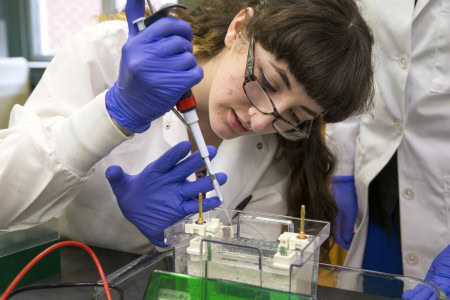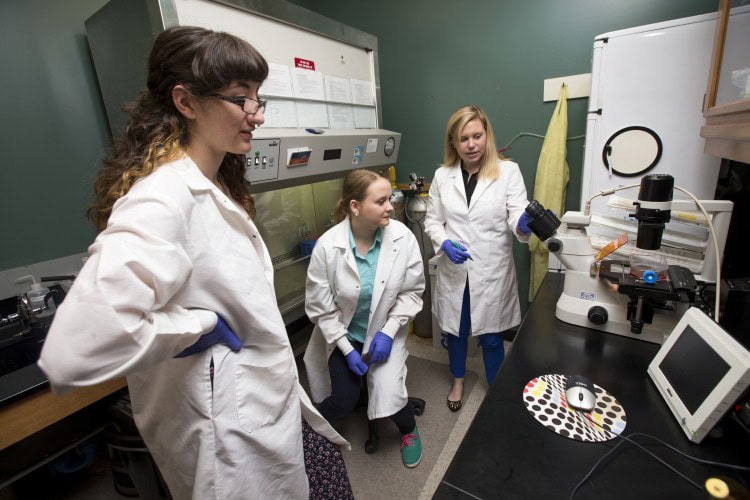Summer research could reveal new methods of stopping allergic reactions
Allergens invade the airways of countless people each year, but two Randolph students and their professor are hoping to lead a counterattack this summer.
Olivia Reed ’16 and Tetiana Poliakova ’18 have teamed up with biology professor Amanda Rumore for their summer research project, “Entry and Localization of Allergen Alt a 1 in Human Airway Epithelial Cells.” Rumore explained that the trio is examining the effects of a fungal allergen when it enters a human airway epithelial cell and hoping to discover where it goes once it enters the cell.
To help reveal its location, a green fluorescent protein will be attached to the allergen, which will appear green under a fluorescent microscope. Rumore said the experiments could give the team an idea of certain drugs that could be used to target the allergen and prevent it from ever crossing the epithelial barrier and entering the cell.
“If we find where it localizes in the cell, that would be information we could share to start collaborating with some other labs who might be studying the drug or therapeutic approach to stopping allergens from entering these cells,” said Rumore.
The trio has spent the first two weeks learning how to grow the cells and keep them alive, and determining if they have all the needed materials to complete their research.
“We’ve also started to run tests to make sure our antibodies work and our protein,” Reed said. “It’s kind of just checking to make sure we can do our experiment.”
Rumore’s prior research has indicated that allergens enter human airway epithelial cells and exit, since they travel through lung tissue. She believes that when Reed and Poliakova conduct a time course experiment–recording the location of the protein at various times–they will see the protein bind to the cell membrane, enter the cell, and then exit.
“That would go along with this hypothesis that the allergen isn’t staying inside the cell, and that it’s actually traveling through the tissue, which would then cause even deeper impact from the allergic response,” she said.
Reed hopes to publish the group’s findings. She also knows the nature of this project and the long hours she has spent in the lab this summer will help prepare her for graduate school. The rising senior from Virginia Beach is already highly involved in campus research, conducting two independent studies with the Randolph College Natural History and Archaeology Collections project and working as Rumore’s biology lab assistant the past two years.
“Since I want to go into disease research, this is extraordinarily similar to what I’ll be doing,” she said.

Olivia Reed loads a gel in order to measure the amount of protein in a sample for her work on a certain allergen in humans.
“This will be especially helpful for her, getting a little head start learning how allergens function within the immune system,” Rumore added.
Poliakova, a native of Ukraine, also considers the project as valuable practice for medical school. While currently undecided, she plans to declare as a double major in biology and chemistry.
“I wanted to get experience in the lab working with cells, doing tissue cultures, and learning techniques so it will be easier for me in the future,” she said.
Rumore said that Randolph’s small class sizes and individualized attention affords both students the unique experience of conducting their own high-level research.
“Both of them are excellent students, but I don’t think they would have this summer research opportunity at many other schools,” she said. “At a much bigger school, it’s going to be much more competitive, and they’re not always going to have professors that can sit down and go over these techniques with them.”
The trio plans to present their findings at the 17th annual Mid-Atlantic Regional Conference for Undergraduate Scholarship (MARCUS) Conference, which this year will be hosted by Randolph College on October 10. They will also showcase their work in Randolph’s 2016 Symposium of Artists & Scholars. Depending on the results, the group may also present at the National Conference on Undergraduate Research.
Tags: Amanda Rumore, Mid-Atlantic Regional Conference for Undergraduate Scholarship Conference, summer research, Summer research 2015, Symposium of Artists and Scholars, Tetiana Poliakova

